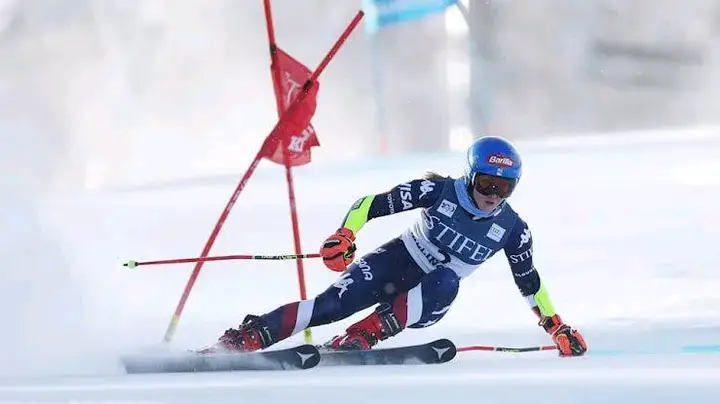Blog
Mikaela Shiffrin Addresses Her Most Prominent Obstacle Prior to Winning the World Cup, Despite the Growing Pressure
Patrick Mahomes is shown celebrating in his first public appearance…
She later revealed the truth on Instagram, writing, “Most people didn’t really realise that the pressure wasn’t entirely off.” It turned out that there was this convoluted, “funky” thing involving World Cup points and starting numbers. What’s the short version? Achieving 500 overall points for the season was a huge accomplishment for her, especially as it secured a higher start number for Giant Slalom next year. Following a life-threatening injury, “That was a really big goal for me,” she said. So this race had an added sense of urgency.
Shiffrin discussed it in her “Moving Right Along” series, describing how much the Sun Valley atmosphere energised her. “The crowd, the fans, the entire atmosphere—was so inspiring, and I really tried to take that inspiration and run with it,” she told reporters. The #MIK100 event, which brought together the whole women’s squad, had a really special vibe. Nonetheless, the 500-point aim was constantly there, driving her.
What about the small Dalmatian-clad fans? They weren’t only cute. According to Shiffrin, “inspiring the next generation means far more to me than resetting records themselves.” That true connection certainly helped her focus, overcome the pressure, reach 500 points, and win. Following the flurry, she flew to New York for a media tour before heading to Innsbruck to reunite with her fiancé, Aleks – a fairly lovely finale to a difficult season. With the Olympic year ahead, you can bet she’s already planning what comes next!
Shiffrin just joined the NWSL Denver Ownership Group.
Mikaela Shiffrin, the skiing great we all know—two Olympic gold medals and an incredible 101 World Cup victories—is carving a completely new line! Just last May, the Vail native announced that she has joined the ownership group of Denver’s future National Women’s Soccer League (NWSL) franchise, which will begin play in 2026. For Shiffrin, who has dominated every alpine skiing category, investing in women’s football seems like a heartfelt return to her Colorado roots.
“I’m beyond thrilled,” Shiffrin added, genuinely happy to be back doing “something so meaningful in the community I call home.” She’s excited about Colorado’s vibrant sports environment, particularly the incredible rise of women’s sports. It’s a nice move that mirrors other stars’ investments in the NWSL.
Denver’s club, ranked 16th in the league, is already making aggressive plays. The ownership group even unveiled plans for a new downtown stadium specifically tailored for women’s football. With Shiffrin bringing her champion’s zeal and star power, the Mile High City’s new football chapter is surely worth seeing!
Mikaela Shiffrin Issues a Serious Warning Regarding Alpine Ski Racing’s Future.

Alpine ski racing stands at a crossroads. Recent remarks by Mikaela Shiffrin—widely regarded as the most decorated alpine skier in history—have sounded the alarm that the sport’s very future may be imperiled if decisive action isn’t taken. As climate change disrupts snowfall patterns and rising temperatures force race cancellations and course alterations, Shiffrin has called on athletes, organizers, and governing bodies to confront the environmental threats undermining the foundations of competitive skiing.
Shiffrin’s platform lends extraordinary weight to her warning. With an unprecedented 101 World Cup victories—including wins across all six alpine disciplines—she has redefined the sport’s record books and captured global attention both on and off the slopes. Her consistency, technical mastery, and unflagging drive have made her not just a champion but an ambassador for ski racing worldwide. When she speaks about the sport’s future, stakeholders listen.
In an interview with NBC Sports’ “On Her Turf,” Shiffrin painted a stark picture of the changing conditions at World Cup venues. “Alpine skiing depends on snow and consistent weather conditions,” she observed. “And we’re not really getting that anymore. It’s like the environment telling us it is super temperamental and angry. And that we’ve done something very wrong.” Her words resonate as athletes face more frequent event cancellations and compressed competition calendars due to unseasonal warmth and unpredictable snowfall.
Scientific data underscores Shiffrin’s concerns. Studies show that average winter temperatures in many traditional ski regions have increased by more than 2°C over the past five decades, reducing natural snow cover and shortening seasons. Glaciers that once hosted early-season races in Soelden and Zermatt are retreating at alarming rates, threatening the viability of alpine skiing’s iconic opener on the Rettenbach Glacier. Without adaptation, key races may vanish or relocate, undermining the sport’s heritage and economic engine.
Athlete-led activism has begun to shift the conversation from performance to preservation. In 2023, Shiffrin joined nearly 200 athletes—including Federica Brignone and Aleksander Aamodt Kilde—in signing an open letter to the International Ski and Snowboard Federation (FIS). The letter demanded transparency on carbon footprints, credible sustainability strategies, and a reshaped World Cup calendar to reduce travel emissions. Its signatories argued that a season spanning continents twice over, as currently scheduled, was no longer tenable.
The FIS has acknowledged these demands but maintains that logistical realities and regional weather patterns limit its flexibility. In response to the petition, the federation pointed to incremental sustainability measures—carbon offsets, hybrid race fleets, and selective event relocation—but stopped short of overhauling its traditional October-to-March season window or dramatically reducing long-haul travel. Critics argue that these steps, while welcome, fall short of the systemic change athletes like Shiffrin deem necessary for the sport’s long-term survival.
Race organizers are also grappling with the costs and feasibility of artificial snowmaking and venue infrastructure upgrades. High-capacity snow guns require vast amounts of water and energy, raising questions about their environmental and financial sustainability. Indoor ski centers, once niche attractions, may offer a controlled alternative, but their construction demands significant investment and carries a hefty carbon footprint. As a result, smaller resorts and local economies that rely on natural snow face existential threats if temperatures continue to climb.
Shiffrin has even called for personal adjustments to her own World Cup schedule, hinting at a shift in early-season planning to align with more reliable snow conditions. “I’m very close to changing my early season schedule to account for the climate impact of all the travel,” she said, illustrating how athletes may need to adapt training and racing choices in response to environmental realities. Such individual decisions, while symbolic, underscore the demand for collective, sport-wide strategies.
Looking ahead, technology and innovation may offer partial relief. Advances in zero-emission snowmaking, renewable energy–powered lifts, and eco-friendly resort design could mitigate some impacts. Event planners are exploring geographically consolidated race clusters to reduce air travel, while FIS has discussed a rotating “climate calendar” that shifts venues in real-time based on alpine weather forecasts. Whether these measures can preserve ski racing’s global footprint remains an open question.
Experts warn that incremental improvements are unlikely to suffice without bold leadership. “There’s a very real threat to what we know and love from winter,” noted Shiffrin in a separate statement captured by Phys.org. “We hope to enjoy skiing and winter recreation for many, many years to come—and that’s under threat right now.” The clock is ticking on both natural snowfields and institutional willpower to enact transformative change.
Mikaela Shiffrin’s impassioned warning echoes far beyond the race course. It challenges every stakeholder—from athletes and coaches to sponsors, broadcasters, and governing bodies—to champion sustainability with the same intensity they bring to competition. As alpine ski racing confronts a future defined by climate uncertainty, Shiffrin’s voice may prove pivotal in steering the sport toward a more resilient and responsible era. Failure to heed this warning risks losing not just races, but the very essence of winter’s most exhilarating spectacle.
-

 Blog8 months ago
Blog8 months ago“Courtside to Aisle-Side: Tyrese Haliburton and Jade Jones Set New Wedding Date”
-

 Blog12 hours ago
Blog12 hours agoCeltic informed their January signing under Martin O’Neill that he wouldn’t play a single minute this season.
-

 Blog8 months ago
Blog8 months agoPat Kelsey sends a strong three-word fiery message to the Louisville basketball’s team after their Cardinals 14th win…
-

 Blog8 months ago
Blog8 months agoMikaela Shiffrin responds to cross-country skier Jessie Diggins’ letter following her failure to secure a solitary podium finish at the FIS Nordic Worlds
-

 Blog10 months ago
Blog10 months agoNetflix releases “The Underdog,” a much-anticipated documentary about Drew Brees. slated for publication on the 25th
-

 Blog6 months ago
Blog6 months agoBehind the Turns: Netflix’s Upcoming Documentary on Mikaela Shiffrin’s Fights, Fears, and Love
-

 Blog7 months ago
Blog7 months agoLegacy Tour Led Zeppelin has officially confirmed their 2026 reunion tour, which will be their first extensive live performances since 2007. The “Led Zeppelin Legacy Tour 2026” will begin on June 10, 2026, at Los Angeles’ SoFi Stadium.
-

 Blog4 days ago
Blog4 days agoReferee from FIFA weighs in on Rangers’ penalty claim, raising major VAR concerns regarding Chermiti appeal
